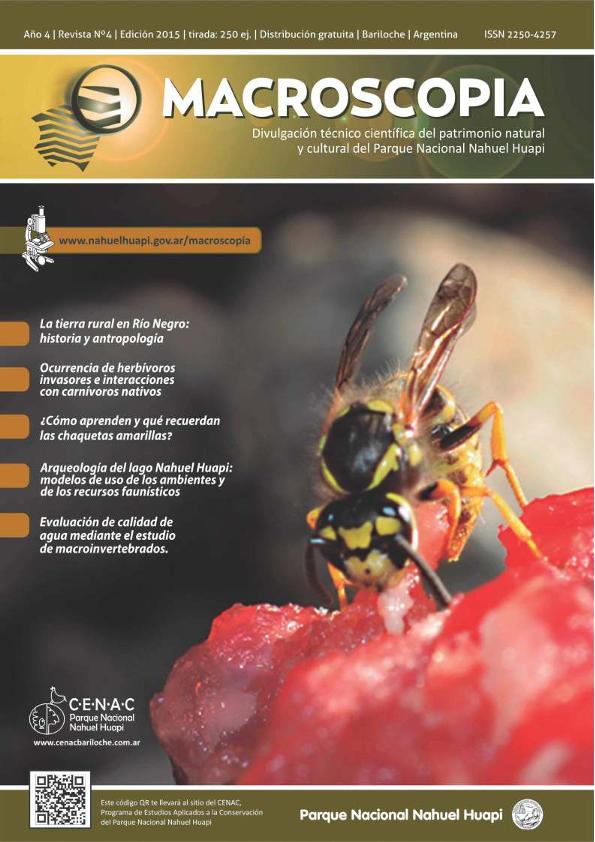Mostrar el registro sencillo del ítem
dc.contributor.author
Cañuqueo, Eliana Lorena

dc.contributor.author
Kropff Causa, Laura

dc.contributor.author
Pérez, Pilar María Victoria

dc.contributor.author
Wallace, Julieta
dc.date.available
2016-12-19T18:33:10Z
dc.date.issued
2015-09
dc.identifier.citation
Cañuqueo, Eliana Lorena; Kropff Causa, Laura; Pérez, Pilar María Victoria; Wallace, Julieta ; La tierra rural en Río Negro: historia y antropología; Parque Nacional Nahuel Huapi; Macroscopia; 4; 4; 9-2015; 2-6
dc.identifier.issn
2250-4257
dc.identifier.uri
http://hdl.handle.net/11336/9746
dc.description.abstract
La intención de este artículo es presentar los resultados preliminares de un proyecto de investigación interdisciplinaria aplicada que se viene desarrollando en el marco de un convenio firmado por la Universidad Nacional de Río Negro y la Legislatura de la Provincia de Río Negro desde agosto de 2014. El objetivo general del proyecto es reponer el contexto histórico y antropológico de los conflictos emergentes que cuestionan la situación dominial de la tierra en Río Negro, a partir de analizar la relación entre la distribución desigual de tenencia y acceso a tierras y recursos naturales y la configuración de ciudadanía en la provincia que conllevan efectos sociales tanto en el presente como en el futuro de la población rionegrina. En este artículo introduciremos, en primer lugar, la metodología de investigación implementada para pasar luego a los resultados preliminares que se agrupan en tres ejes. Comenzaremos con la descripción de las características de las denuncias presentadas ante la Comisión Investigadora para el Relevamiento de Transferencias de Tierras Rurales de la Legislatura provincial entre 2012 y 2014 para luego vincularlas con problemáticas de orden general. A continuación, abordaremos los procesos históricos que inciden en la configuración de accesos diferenciales a la tierra en el presente. Finalmente, presentaremos el análisis hermenéutico de dos de las leyes provinciales que deben aplicarse en los conflictos actuales: la Ley 279 que establece el Régimen de Tierras Fiscales y la Ley 2.287 denominada Ley Integral del Indígena.
dc.description.abstract
The aim of this article is to present the preliminary results of an applied interdisciplinary research project which is being developed subjected to an agreement between the National University of Río Negro and the Legislature of the Province of Río Negro since August 2014. The overall objective of the project is to settle both the historical and anthropological contexts of the emerging conflicts related to land in Río Negro, by analyzing the relationship between the unequal distribution of tenure, land and natural resources that result in an uneven citizenship in the province. This has social effects both in the present and the future of the Río Negro population. In this article we introduce, first, the research methodology implemented in the project and then move to the preliminary results which are grouped in three lines. First, we start with the description of the nature of the demands received by the Commission for the Research on the Transfer of Rural Land at the Legislature of Río Negro between 2012 and 2014 and then link them to issues of a general nature. Then, we will address the historical processes that influence the differential accesses to land in the present. Finally, we present the hermeneutical analysis of two provincial laws to be applied in today's conflicts: Law 279 which establishes the regime of Government Lands and the so called Indigenous integral Law 2,287.
dc.format
application/pdf
dc.language.iso
spa
dc.publisher
Parque Nacional Nahuel Huapi
dc.rights
info:eu-repo/semantics/openAccess
dc.rights.uri
https://creativecommons.org/licenses/by-nc-sa/2.5/ar/
dc.subject
Tierra Rural
dc.subject
Historia
dc.subject
Antropología
dc.subject
Río Negro
dc.subject.classification
Otras Humanidades

dc.subject.classification
Otras Humanidades

dc.subject.classification
HUMANIDADES

dc.subject.classification
Otras Humanidades

dc.subject.classification
Otras Humanidades

dc.subject.classification
HUMANIDADES

dc.title
La tierra rural en Río Negro: historia y antropología
dc.type
info:eu-repo/semantics/article
dc.type
info:ar-repo/semantics/artículo
dc.type
info:eu-repo/semantics/publishedVersion
dc.date.updated
2016-12-12T14:35:25Z
dc.journal.volume
4
dc.journal.number
4
dc.journal.pagination
2-6
dc.journal.pais
Argentina

dc.journal.ciudad
Bariloche
dc.description.fil
Fil: Cañuqueo, Eliana Lorena. Consejo Nacional de Investigaciones Científicas y Técnicas. Centro Científico Tecnológico Patagonia Norte. Instituto de Investigaciones en Diversidad Cultural y Procesos de Cambio; Argentina. Universidad Nacional de Rio Negro; Argentina
dc.description.fil
Fil: Kropff Causa, Laura. Consejo Nacional de Investigaciones Científicas y Técnicas. Centro Científico Tecnológico Patagonia Norte. Instituto de Investigaciones En Diversidad Cultural y Procesos de Cambio; Argentina. Universidad Nacional de Rio Negro; Argentina
dc.description.fil
Fil: Pérez, Pilar María Victoria. Consejo Nacional de Investigaciones Científicas y Técnicas. Centro Científico Tecnológico Patagonia Norte. Instituto de Investigaciones en Diversidad Cultural y Procesos de Cambio; Argentina. Universidad Nacional de Rio Negro; Argentina
dc.description.fil
Fil: Wallace, Julieta . Provincia de Rio Negro; Argentina
dc.journal.title
Macroscopia
dc.relation.alternativeid
info:eu-repo/semantics/altIdentifier/url/http://www.nahuelhuapi.gov.ar/multimedios/macroscopia.html
Archivos asociados
